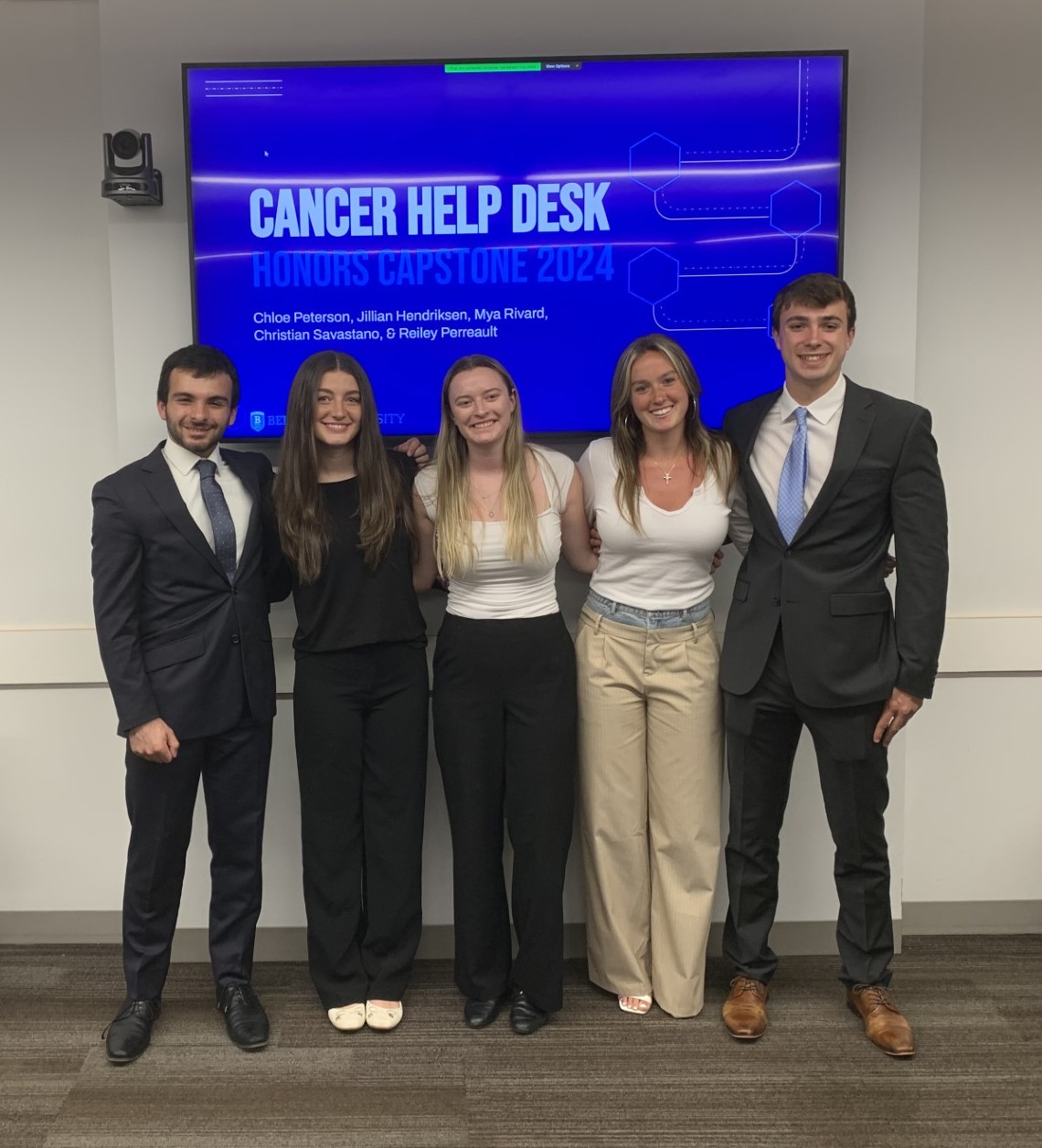
Students Serve as Consultants for Cancer Care Startup
Chloe Peterson ’25 never anticipated she could make a difference in the lives of cancer patients and their families — without leaving her Bentley classroom.
“As a Data Analytics major, I’m used to working with large datasets, and it’s easy to forget that those numbers often represent real people with real experiences,” she explains. But after completing an Honors Capstone course with Helen Meldrum, an associate professor of Natural and Applied Sciences, last spring, Peterson says she’s experienced a “profound shift in perspective that’s added a new layer of empathy and understanding to my work.”
Under Meldrum’s mentorship, Peterson and four other students from Bentley’s Honors Program — Jillian Hendriksen ’25, Reiley Perreault ’25, Mya Rivard ’24 and Christian Savastano ’25 — served as business consultants for Cancer Help Desk, a virtual startup that launched in August 2023 to provide personalized education, guidance and support to individuals dealing with cancer. Through its online platform, the nonprofit connects patients and caregivers with experienced oncology nurses and other medical experts who can answer questions, identify local resources and suggest individualized treatment options to discuss with healthcare providers, a process collectively known as cancer navigation.
Two of Cancer Help Desk’s co-founders, CEO Rebecca Driscoll and Chief Patient Officer Deb Christensen, reached out to Meldrum — a well-regarded figure within the cancer care community, owing to her 35-plus year career as a healthcare consultant, primarily with oncology-focused organizations — for help identifying ways to increase awareness of and support for their organization. Meldrum, in turn, enlisted her students to help think through the nonprofit’s challenges.
RELATED: Students take the lead on immersive learning project with Meta
According to the National Cancer Institute, approximately 40% of Americans will be diagnosed with cancer at some point during their lifetimes. Longstanding inequities in the U.S. healthcare system, however, prevent many cancer patients from receiving timely access to quality care — in particular, Americans living in rural areas, which offer fewer prevention, detection and treatment facilities. Additional research has shown that other social determinants of health, such as race, gender and economic status, contribute to significant disparities in cancer incidences and outcomes.

For many of the students, discovering the complexities of cancer care proved eye-opening: “I was shocked to discover how splintered cancer care is, even among oncology specialists,” says Savastano, a Corporate Finance and Accounting major who, as a participant in Bentley’s Advanced Standing in Finance program, will graduate this May with both a bachelor’s and master’s degree. “Given cancer’s prominence as a public health issue, I was also shocked to learn how many patients in America struggle to find high-quality or even consistent care.”
With input from Driscoll and Christensen, the students created a survey consisting of both multiple choice and open-ended questions to help them better understand cancer patients’ needs and experiences. After identifying 1,000-plus oncology support groups serving primarily rural areas in all 50 states, the team distributed the survey via email and social media. Responses revealed that communication was a significant concern for patients, with 34% of respondents agreeing with the statement “I feel there are treatment options that have not been shared with me.” Respondents also shared frustration about having to coordinate care from multiple doctors and oncology specialists. “I wish I had someone to coordinate with providers ... at a certain point, it’s so hard to keep track of tests and appointments,” one respondent noted. And 27% of patients and caregivers reported negative experiences with health insurance companies, including financial anxieties and treatment delays.

While the students were tabulating their survey results, the Biden administration announced it had brokered agreements with leading health insurance companies to expand coverage for cancer navigation services for more than 150 million Americans. This news led to one of the team’s major recommendations for Cancer Help Desk: Collaborating directly with insurance companies. That way, Savastano says, the nonprofit can make its services known to various providers while learning more about differences in cancer care coverage that can help with their client consultations.
The student consultants also recommended that Cancer Health Desk partner with mental health specialists to provide additional resources for clients’ emotional support, and that the nonprofit apply for corporate and foundation grants to support its long-term operational costs. The team also suggested improvements to the Cancer Help Desk website, several of which — such as featuring consultation information more prominently, adding client testimonials and including photos and bios of the organization’s co-founders and volunteers (“to lend greater credibility by emphasizing the people behind the product,” Savastano explains) — Driscoll and Christensen have since implemented. Both Cancer Help Desk co-founders are grateful to Meldrum and her students for their thorough research and thoughtful analysis.
The students are similarly appreciative of the experience. “Working with Cancer Help Desk gave me an opportunity to work as part of a diverse team, communicate directly with stakeholders and manage a project with real-world implications,” Peterson explains. And while she acknowledges that “these skills and insights will be invaluable to my future career,” it’s not her primary takeaway.
“I think STEM-related majors often forget that data represents real people with real experiences,” she says. “This experience has shown me how important it is for businesses to make informed, ethical decisions that positively impact society.”

